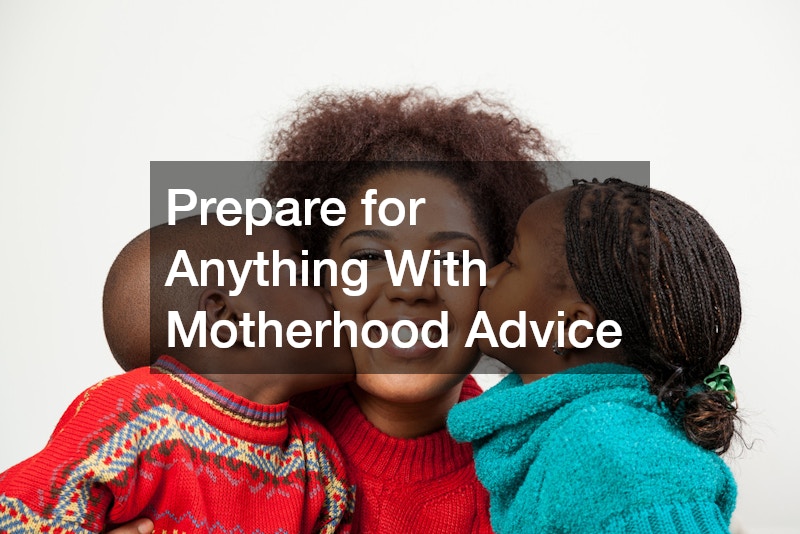A Mother’s Journey
Motherhood is often described as the most rewarding and demanding role a person can undertake. It’s a lifelong journey filled with unpredictable twists, tender moments, and steep learning curves. From holding your newborn for the first time to guiding your teen through the maze of adolescence, motherhood constantly evolves. Being prepared at every stage makes this journey not only manageable but deeply fulfilling. This guide offers comprehensive motherhood advice to help you navigate the demands of parenting. Whether you’re deciding on early learning childcare, tackling toddler tantrums, or helping a teenager build confidence, these insights will support you through each unique phase.
Motherhood is not about perfection — it’s about preparation, compassion, and adaptability. The more insight you have into what lies ahead, the better you can respond to the needs of both your child and yourself. No two parenting journeys are identical, but having the right tools empowers you to make thoughtful decisions that nurture both your child’s growth and your peace of mind.
What Are the Essential Tips for New Mothers?
The early days of motherhood can feel like a whirlwind. New mothers often find themselves overwhelmed with advice, expectations, and self-doubt. It’s important to realize that while guidance is valuable, every baby is different — and so is every mom. Your instincts are stronger than you may believe, and it’s okay to follow them. Accepting help from loved ones or professionals can be transformative, whether it’s through emotional support or practical assistance like choosing reliable early learning childcare when you’re ready. Childcare that emphasizes early learning can help foster your child’s development from infancy, offering them vital cognitive and social experiences.
One piece of motherhood advice that stands the test of time is this: you are enough. In a world filled with online comparisons and constant input, grounding yourself in your unique relationship with your baby is key. Making small, intentional choices — like researching care providers, practicing daily bonding, or simply allowing yourself rest — helps you grow into your role with confidence and love.
How Can I Establish a Consistent Sleep Schedule for My Baby?

Sleep is often the most elusive part of early parenting. A consistent sleep schedule doesn’t just benefit your baby — it restores your energy and mental well-being, too. Creating an evening routine that gently signals bedtime can make a significant difference. Activities like giving a warm bath, singing softly, or simply dimming the lights can help ease your baby into sleep.
When it comes to tailored motherhood advice, considering your child’s specific needs is essential. If your baby has medical or sensory needs, a special needs bed can provide both comfort and security, helping establish a reliable routine. Understanding your child’s sleep patterns and committing to a soothing bedtime process reflects not just care but the practical wisdom that makes parenting less stressful and more nurturing.
Another piece of motherhood advice worth embracing is the importance of consistency over perfection. Some nights won’t go as planned, and sleep regressions are common. But sticking to your routine as closely as possible — even when it’s disrupted — teaches your baby what to expect and reassures them that sleep is a safe, predictable part of their day. With time, patience, and a flexible mindset, healthy sleep habits will become second nature for both of you.
What Is the Best Way to Balance Work and Motherhood?
Balancing a career and family life can feel like an impossible task. Whether you’re working part-time, full-time, or remotely, the demands of your job don’t lessen the responsibilities you carry as a mother. The key lies in setting boundaries and finding systems that support both roles. Clear communication with your employer, strategic scheduling, and building in regular family time can help create a sense of balance.
Another important part of motherhood is learning when and how to ask for help. Utilizing services like puppy daycare for your pet or hiring a part-time sitter can free up valuable time and mental space. Prioritizing tasks, saying no to unnecessary obligations, and giving yourself grace during busy seasons can help create a more harmonious work-life balance.
It’s also helpful to seek motherhood advice from people who’ve walked this road before you. Mentors, friends, or even parenting groups can offer emotional support and practical tips you may not have considered. Every mother’s balance looks different — and that’s okay. What matters is that your system works for your unique circumstances and allows you to feel present both at work and at home.
How Can I Encourage Healthy Eating Habits in My Child?

Nurturing healthy eating habits in children starts early and continues through all stages of development. One of the most effective ways to encourage a balanced diet is to make nutritious food a regular part of family life. Children learn by observing, so when they see you making healthy choices, they’re more likely to follow suit. Involving them in meal preparation, like stirring ingredients or picking out fruits at the grocery store, fosters curiosity and makes them more open to trying new foods.
According to longstanding tradition, developing a positive food culture at home can influence how children approach nutrition for life. Routine visits to a pediatric dentist can further reinforce these habits by linking healthy eating to strong teeth and overall wellness. It’s not just about avoiding sugar, but also about cultivating mindfulness and joy around food, leading to balanced and empowered choices.
For even more effective results, apply practices that encourage flexibility rather than rigidity at the dinner table. Avoid turning meals into battlegrounds — instead, offer healthy choices and allow your child some autonomy. Over time, their willingness to try new foods and listen to their body’s hunger cues will grow, shaping a healthier and more relaxed relationship with food for years to come.
What Strategies Are Effective for Handling Toddler Tantrums?
Toddler tantrums are a natural part of emotional development, and while they can be challenging, they also present opportunities to teach self-regulation. Remaining calm in the face of a meltdown models emotional control, even when your patience is being tested. Often, tantrums stem from a toddler’s frustration at not being able to fully express themselves.
A valuable skill is to meet emotional chaos with emotional presence. Participating in an infant massage class not only helps soothe physical tension in your child, but also deepens your connection and teaches them that their body is safe and loved. These small, mindful interactions lay the groundwork for emotional intelligence and self-soothing strategies that will serve your child for years.
It’s also helpful to remember that prevention is just as powerful as reaction. One piece of motherhood advice that’s often overlooked is the importance of preparing your toddler for transitions. Giving five-minute warnings before a change in activity, using visual cues, or setting clear expectations can significantly reduce tantrums. Consistency and empathy combined can create a calmer environment where your child learns to navigate big emotions with your support.
How Do I Promote Positive Sibling Relationships?

Siblings play an important role in shaping one another’s childhood experience. While rivalry is normal, nurturing a cooperative relationship early can lead to lifelong bonds. The foundation starts with you. How you handle disagreements, celebrate individual strengths, and foster shared experiences influences how your children interact.
One timeless skill is to lead by example when it comes to relationships. Enrolling your children in collaborative environments like a nature preschool gives them space to engage with the world — and each other — through shared exploration and mutual support. Outdoor learning encourages teamwork, problem-solving, and patience, all of which translate into more harmonious sibling dynamics at home.
Another powerful form of motherhood advice is to create opportunities for siblings to see each other as allies, not competitors. Assigning joint responsibilities — like feeding a pet, setting the table together, or caring for plants — helps foster cooperation and shared success. Celebrating their teamwork with praise or special outings reinforces the idea that their relationship is valuable and worth investing in.
How Can I Foster a Strong Emotional Bond with My Child?
Building a strong emotional bond with your child begins with being present. It’s not about the number of hours you spend together, but the quality of those moments. Making eye contact, listening attentively, and validating your child’s feelings all contribute to a sense of emotional security.
If you’re seeking a meaningful relationship, consider engaging in shared creative pursuits such as art summer camps. These experiences allow children to express themselves freely while creating memories alongside you or with peers. Emotional bonds are nurtured in spaces where children feel seen and heard, and where their imagination is celebrated rather than restricted.
Another often-shared piece of motherhood advice is the importance of physical closeness and shared rituals. Simple moments — like a bedtime story, a morning hug, or a weekly walk around the neighborhood — can become anchors of love and trust. These rituals build emotional resilience and help your child feel deeply connected to you, even as they grow into greater independence.
What Are Some Practical Tips for Managing a Household?

Managing a household while raising children is no small feat. Between school, work, and daily responsibilities, life can quickly become overwhelming. Having a consistent routine helps everyone in the family know what to expect, which can minimize chaos. Small organizational systems, like using a family calendar or planning meals in advance, can make a huge difference in your day-to-day life.
Experienced motherhood advice often emphasizes investing in long-term structure. Choosing a well-rounded private elementary school that aligns with your family’s values and offers extended programs can relieve pressure and support your child’s academic and social needs. The more streamlined your household systems become, the more time and energy you’ll have to focus on nurturing your family.
How Can I Ensure a Smooth Transition Back to Work After Maternity Leave?
Returning to work after maternity leave can stir a mix of emotions — from guilt and anxiety to anticipation and relief. Preparing both mentally and logistically can ease this transition. Doing a few dry runs before your return date helps establish a manageable routine. You might consider using services like a pet hotel for a few days if managing a pet is adding stress during this adjustment period.
The best motherhood advice for this stage is to be gentle with yourself. Reentry into the workplace doesn’t have to be perfect — it has to be realistic. Celebrate small wins, remain flexible when things don’t go to plan, and maintain open communication with both your support system at home and your employer. Over time, you’ll find a sustainable balance between your career goals and family responsibilities.
What Advice Is There for Navigating Teenage Years as a Mother?
Parenting a teenager comes with a fresh set of challenges. It’s a time when children seek more independence, form deeper relationships, and begin making decisions that shape their future. While it may feel like they’re pulling away, your presence is more important than ever.
One piece of enduring motherhood advice is to stay engaged without becoming overbearing. Attending your teen’s games, helping them shop for sporting goods, or simply spending time together doing things they enjoy sends the message that you care about their interests and identity. This consistent presence, combined with open, judgment-free conversations, strengthens your bond and supports their journey toward adulthood.
Growing and Guiding
Motherhood is a path filled with learning, sacrifice, and transformation. It’s not just about raising a child — it’s about growing alongside them. From selecting early learning childcare and dealing with toddler tantrums to investing in your teenager’s hobbies like sporting goods, every stage brings its own set of challenges and triumphs. With patience, flexibility, and the willingness to adapt, you can handle anything motherhood throws your way.
The most powerful motherhood advice you can embrace is to trust yourself. Challenges will arise, and not every solution will be obvious. But by staying curious, staying present, and believing in your ability to meet your child’s needs, you’ll navigate motherhood with purpose, resilience, and heart. Each season brings new lessons — and with the right guidance, you’re more than equipped to grow through them all.

